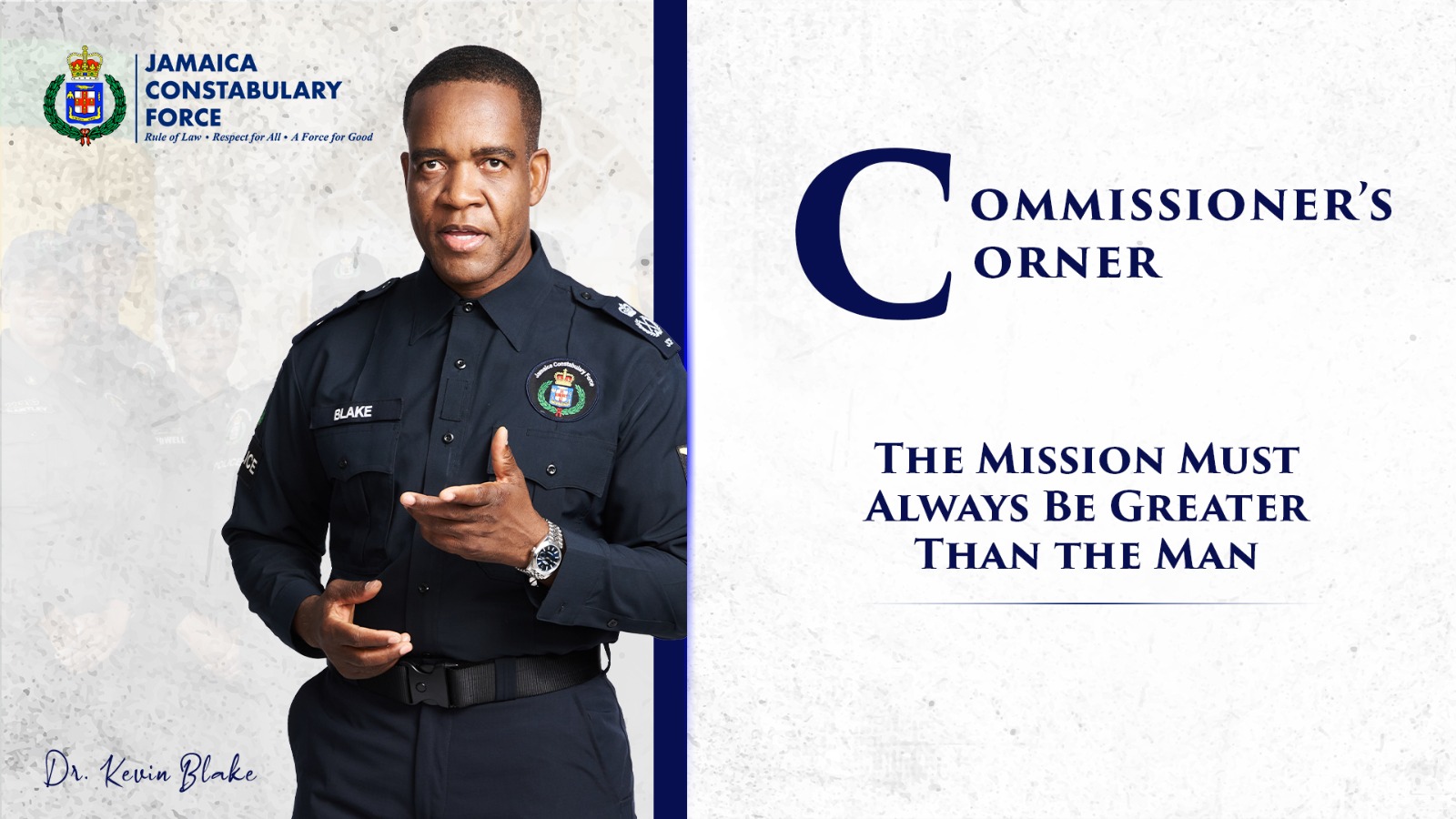
The Mission Must Always Be Greater Than the Man
Public service is a discipline of restraint. It demands vision without vanity, conviction without self-promotion, and purpose without personal reward. In his latest Commissioner’s Corner, Dr Kevin Blake delivers a timely reflection on the kind of leadership Jamaica requires at this stage of its transformation. His message is neither sentimental nor defensive. It is a study in moral focus and institutional clarity.
At the heart of his column lies the central argument that national progress collapses when personal ambition overtakes collective purpose. The Commissioner writes with calm precision, reminding his members that “…our eyes must remain fixed on the mission; safer communities and a stronger Jamaica.” His words echo beyond the Jamaica Constabulary Force (JCF) and speak to every public institution where ego, distraction, and self-interest threaten to corrode integrity.
Upon close examination, Commissioner Blake’s commentary is rooted in humility. He acknowledges the country’s remarkable gains in public safety but deflects the temptation to personalise success. “Let us remind ourselves that we have not, and could not have done this by ourselves,” he writes. “There are so many stakeholders who are also to be credited for the steady trend towards the peaceful society that we long desired.” This framing is an excellent example of strategic leadership, which affirms that institutional success is collective, and that transformation in public life must rest on collaboration, not competition.
The Commissioner’s philosophy of leadership is strikingly modern. It rejects the cult of personality that often surrounds authority and replaces it with a framework of purpose. His words are a rejection of those who seek validation rather than to deliver public value. “We must never be distracted by the noise of those who measure success by personal validation rather than national transformation,” he warns. Indeed, leadership – particularly in the public sector – must serve the mission, not manipulate it for prestige.
That focus on mission is what defines the JCF’s current phase of transformation. The organisation is being rebuilt not through slogans or symbolic gestures, but through systems of accountability, training, and professional discipline. The Commissioner’s stance captures this transition; a move from personality-driven management to policy-driven execution. When he cautions, “While some of these detractors are loud, we must remain grounded and focused on the greater good,” he articulates the mental posture required for progress. Discipline must not waver because of distraction.
But Dr Blake’s reflections extend beyond institutional matters. He offers a moral commentary on the state of national ambition. “A low-crime Jamaica may not suit all in the society,” he observes, describing those who thrive on disorder and view progress as a threat to their relevance. His insight exposes a subtle truth about public life: reform does not only require better systems; it demands cultural maturity. To sustain progress, Jamaica must cultivate citizens, and leaders, whose motives align with the mission of national upliftment, not personal gain.
This view of leadership places integrity at the core of transformation. It frames humility as a strategy, not a virtue alone. It reminds those who hold power that legacy is not measured in applause or attention, but in outcomes that endure. As Dr Blake affirms, “Our mission as a nation has very little room for this. Restoring peace to our communities is not a JCF win, it is a win for Jamaica.”
The Commissioner’s language carries a quiet authority. It suggests that leadership maturity is not found in grand declarations, but in consistency, restraint, and commitment to the greater good. That discipline is what has guided the JCF’s reforms and the broader public sector modernisation underway across government. When institutions function on principle, citizens experience reliability, predictability, and trust. The Commissioner’s ethos embodies that idea, the belief that sustainable peace depends on the strength of systems and the humility of those who serve them.
Dr Blake closes his column with words that transcend their immediate audience. “Let us continue to serve with integrity and humility, always remembering that our purpose is greater than any individual recognition.” This is not a ceremonial reminder. It is a charge. Jamaica’s transformation depends on leaders who understand that the mission must always outweigh the man.
Progress endures when institutions, not individuals, are the vessels of trust. The JCF’s evolution is demonstrating that truth in real time. It is showing that discipline, collaboration, and moral clarity can move a country closer to peace. The task before us as public servants and citizens alike, is to keep our eyes fixed where the Commissioner has pointed them; i.e. on the mission.







